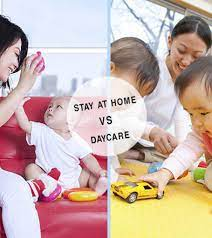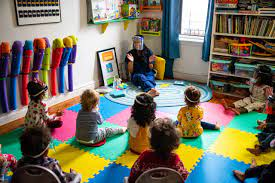For decades, the debate between daycare and stay-at-home child-rearing has been a topic of discussion amongst parents, educators, and psychologists. Both options have their merits and downsides. With the increasing need for dual incomes in today’s economy and the changing dynamics of our family income structures, the decision of daycare vs stay at home child development has become more complex. This blog post delves into the developmental impacts of both daycare and stay-at-home child-rearing to offer a comprehensive understanding.
The Daycare Environment
1. Social Skills Development:
Daycare centers provide a unique environment where older children learn how who can interact with their peers. This regular interaction helps children develop essential social skills, such as sharing, conflict resolution, and effective communication.
2. Structured Learning:
Many daycare centers start school and offer long hours of structured learning environments educating children. This can help children get accustomed to a routine, develop a foundation for academic learning, and foster cognitive skills.
3. Exposure to Diversity:
Daycare centers bring together families many children from many families and various backgrounds. This diversity of family and can help children develop an understanding and appreciation of different cultures and lifestyles.
4. Independence:
Being away from their primary caregivers staying stay at home mom, can help children develop a sense of independence. They learn to rely on themselves and trust other authority figures.
5. Risk of Illness:
On the downside, daycare centers can expose parental leave the children exposed in daycare to more illnesses, especially in the early days. However, some argue this can strengthen the child’s immune system in the long run.
Stay-at-Home Parenting
1. Strong Parent-Child Bond:
One of the most significant benefits of stay-at daycare vs stay at-home parenting is the opportunity to create a deep bond with the child. This secure attachment can lead to better emotional and psychological outcomes for most parents and the child.
2. Personalized Attention:
Stay-at-home parents can cater their child care more to their child’s specific needs and interests, providing a tailored developmental experience.
3. Consistency:
Children thrive on consistency, and stay-at-home parenting can offer a stable and predictable home environment, which can be particularly beneficial during a child’s early childhood years.
4. Limited Social Exposure:
Unless working parents and affluent families make a concerted effort, a stay at home parent–at-home children might have limited exposure to peers. This can delay the development of some social skills.
5. Economic Implications:
One parent, one income and choosing to stay at home can have economic implications for many parents with other children in the family. While there’s a saving on daycare costs, the loss of one income can be challenging for some families.
Research on the Topic
Multiple studies have explored negative effects on the developmental outcomes of children based on their early years’ environment. Some research suggests that high-quality daycare centers, with well-trained staff, high quality care and good facilities, can have positive cognitive and social outcomes for children. These children often perform better academically in their later years.
Conversely, other studies have highlighted the benefits of a stay at home moms–at-home parenting, emphasizing the emotional security and stability it provides to children. The National Institute of Child Health and Human Development found that children with stay at home moms/-at-home parents in their initial years displayed better behavior than those in daycare or group care.
However, it’s crucial to note that the quality of care, whether at home or in daycare, plays a more significant role in cognitive outcomes and in negative outcomes than the type of care. A loving, stimulating, and stable environment staying home is key to positive child development.
Making the Right Choice
The decision between daycare and a full daycare vs. stay at home dad or-at-home parenting is deeply personal and varies based on individual family circumstances. Here are some factors to consider:
- Financial Implications: Analyze the economic impact of one parent staying at home versus the costs of daycare.
- Career Aspirations: Consider the career goals and aspirations of the parent considering staying at home. Will there be opportunities to return to work later?
- Child’s Needs: Some children thrive in social environments, while others might benefit from a quieter, one-on-one interaction.
- Quality of Daycare: If considering daycare, research the quality of available options. Look for centers with trained staff, good facilities, and a structured curriculum.
- Social Opportunities: If one parent stays at home, seek out opportunities for the child to interact with peers, like playgroups or activity classes.
Stay at home Parents
Stay-at-home parents, often overlooked in a fast-paced society, play a crucial role in child development. This choice vs stay at home now, made by millions of mothers and fathers, involves a full-time commitment to parenting without the direct financial compensation that comes with the long hours financial responsibilities of a typical job.
The Role They Play
A really stay at home dad or mom-at-home parent is actively involved in every facet of their child’s day:
- Teaching: From teaching a child how to speak, to the intricacies of tying a shoelace, stay-at-home parents are their child’s first teacher.
- Nurturing: These parents are always there to offer a comforting hug or soothing words, ensuring emotional well-being.
- Organizing: Managing the home, coordinating activities, and ensuring everyone’s needs are met, are just a few of the organizational feats they handle daily.
Benefits of Being a Stay-at-Home Parent
- Deep Parent-Child Bonding: Spending maximum time with the child helps in forming an unbreakable bond.
- Tailored Child Development: Stay-at-home parents can customize learning and play activities based on their child’s specific needs and interests.
- Controlled Environment: Parents have more control over their child’s environment, from diet to daily routines and values.
Children’s Development
Children’s development is a continuous journey, marked by milestones and influenced by behavioral effects of a myriad of factors. As every child’s development is unique, there’s a broad spectrum of what’s considered “normal” development. It’s essential for caregivers to provide a conducive environment, support, and guidance, ensuring children can reach their full potential. Understanding developmental milestones helps in identifying any delays or concerns, ensuring timely interventions when needed.
Daycare Program
A daycare program provides a child care for and supervision for children while their parents or guardians are at work, running errands, or otherwise engaged. Daycare programs are high quality childcare and can be crucial in supporting a child’s early development and preparing them for schooling.
Types of Daycare Programs
- Home-based Daycare: Usually run by an individual in their home. They often have fewer children and provide a home-like environment.
- Center-based Daycare: This is a larger setup, often accommodating multiple children of different age groups. They typically have a structured curriculum and trained staff.
- Preschool Programs: Focus on early education along with childcare.
- Drop-in or Flexible Care: For parents with irregular or unpredictable work schedules.
2. Components of a Daycare Program
- Structured Schedule: Even in a less formal setting, children often follow a routine that includes storytelling, playtime, snack, and naptime.
- Early Education: Many daycare centers incorporate learning activities to promote cognitive development.
- Social Interaction: Allows children to play and learn with peers.
- Physical Activities: Includes both indoor and outdoor play, helping to hone motor skills.
- Meals and Snacks: Nutritionally balanced meals and snacks are typically provided.
3. Benefits of Daycare Programs
- Social Skills: Interaction with peers helps develop communication and interpersonal skills.
- Preparation for School: Structured activities and routines prepare children for the schooling environment.
- Safety: A well-run daycare provides a safe environment for children.
- Peace of Mind for Parents: Parents can engage in work or other activities knowing their children are safe and cared for.
Behavioral Problems
Behavioral problems, often referred to as disruptive behavioral disorders, encompass a range of issues associated with children, adolescents, and even adults. These behavioral problems can manifest as prolonged patterns of disobedience, hostility, defiance, or disruptive behaviors beyond what is considered typical for a particular age or developmental stage. Understanding these issues is crucial for timely intervention and effective management.
Maximizing Educational Opportunities
In an increasingly interconnected and evolving world, educational opportunities play a pivotal role in shaping individuals’ futures and societies at large. The breadth of these opportunities, however, extends beyond traditional schooling to encompass a wide array of experiences cognitive skills that foster learning and personal growth.
Conclusion
There’s no one-size-fits-all answer when it comes to child-rearing decisions. What’s paramount is the child’s well-being and the family’s overall happiness. Whether it’s daycare or stay-at-home parenting, the choice should align with the family and child’s life values, needs, and circumstances. Every one child’s life is unique, and as long as parents find them as they are in a loving, stimulating environment, they will thrive.



Recent Comments